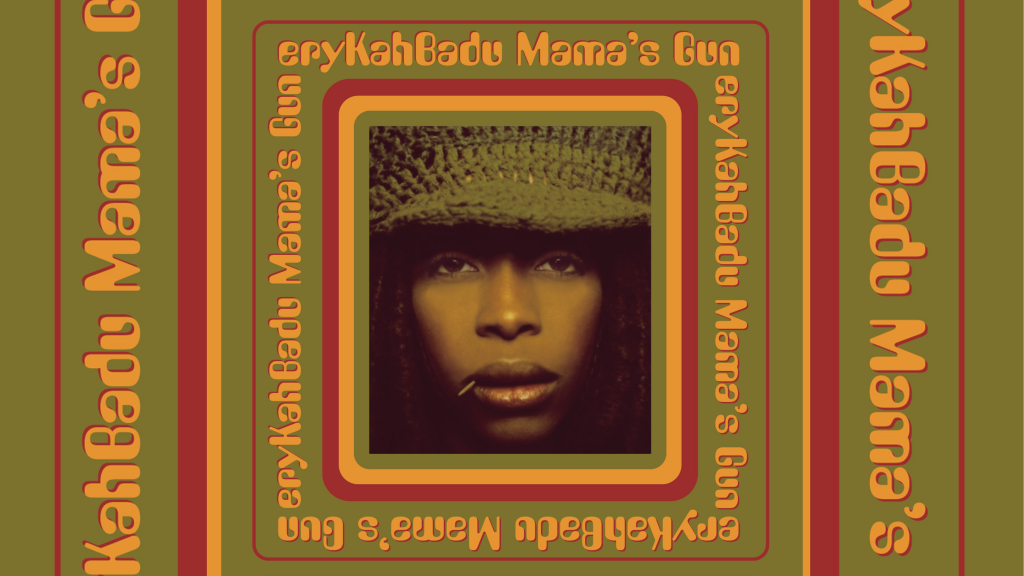The Progressive Underground: Erykah Badu’s ‘Mama’s Gun’ is a soulful shot heard around the world
Chris Campbell January 8, 2025Welcome to “Liner Notes,” where we peel back the layers of iconic albums, exploring the stories, collaborations and cultural contexts that make them timeless.

Erykah Badu's second studio album, "Mama's Gun," was released in November 2000.
In the latest edition of Liner Notes, we dive into “Mama’s Gun,” the 2000 release from the high priestess of soul, Erykah Badu.
Let’s rewind a bit. Badu burst onto the scene in 1997 with her debut album “Baduizm,” a record that captivated the world with its blend of soul and hip-hop. The success was meteoric — No. 1 on the R&B charts, comparisons to Billie Holiday, and a new title for Badu: the “Queen of Neo-Soul.” With her headwraps, ankhs, and earthy elegance, she became a symbol of authenticity in an era that craved it.
Fast forward a few years. Life had evolved for Badu — her relationship with André 3000 of OutKast had transitioned, and she was raising their son, Seven. Enter “Mama’s Gun.” Recorded at Electric Lady Studios, the sacred ground of the late Jimi Hendrix, this album saw Badu strip away the mysticism to reveal her rawest self. Collaborating with the Soulquarians — a collective of musical titans like Questlove, J Dilla, James Poyser, D’Angelo, Common, Pino Palladino and various others — “Mama’s Gun” became a symphony of live instrumentation and hip-hop innovation.
These weren’t just jam sessions; they were alchemical rituals, blending live music production with the sonic experimentation of hip-hop beats.
Questlove held the heartbeat, J Dilla spun rhythmic magic, Pino Palladino’s bass lines gave the music its soul, and James Poyser’s keyboards tied it all together. And at the center of it all was Badu, crafting what would become her magnum opus.
Let’s set the tone with the album’s opening salvo, “Penitentiary Philosophy.”
Track: “Penitentiary Philosophy”
A gritty explosion of guitars and funk-infused chaos, “Penitentiary Philosophy” challenged societal oppression and mental imprisonment, announcing that this was not Baduizm. The track is a fiery introduction to “Mama’s Gun.”
Track: “Didn’t Cha Know”
“Didn’t Cha Know” showcased the late, great J Dilla’s genius as he totally flipped Tarika Blue’s 1977 “Dreamflower” into a lush, transcendent soul anthem, thus adding to the mystique of the album. The track is a quintessential example of Dilla’s transformative touch.
Moving on, we spotlight a self-love anthem.
Track: “Cleva”
With Pino Palladino’s slinky bass line and Badu’s honest lyrics, it celebrates imperfections with an effortlessly cool, sultry groove — which feels like a Sunday morning in musical form.
Now, we turn to one of the album’s most poignant moments, a track dedicated to Amadou Diallo, a 23-year-old unarmed man who was shot 19 times by four New York City Police Department officers.
Track: “A.D. 2000”
The officers involved in Diallo’s fatal shooting were charged with second degree murder but later acquitted at trial, prompting national outrage. Badu wrote this haunting ballad in mournful protest, her voice carrying the weight of grief and resilience.
Next, we highlight the celestial beauty of “Orange Moon,” a poetic love song that radiates warmth and transcendence.
Track: “Orange Moon”
On “Orange Moon,” Badu’s vocals soar as the instrumentation feels like a gentle embrace, painting an ethereal soundscape that is a moment of transcendent audio elegance.
Up next is the album’s lead single, a track written by Badu and the late Isaac Hayes.
Track: “Bag Lady”
“Bag Lady” is an emotional anthem of liberation, as it portrays a woman who is trying to begin a new relationship but has too much emotional baggage, preventing her from getting close to anyone. The song’s message? Pack light and have hope for the future. The track also includes a nod to Dr. Dre’s “Xplosive.”
The album rounds out with “Sugah,” the raw emotion of “I’m In Love With You,” featuring Stephen Marley, the biting satire of “Booty,” and the sultry jazziness of “Kiss Me On My Neck (Hesi),” and the sprawling, epic three-part suite “Green Eyes.”
The legacy of “Mama’s Gun” is undeniable. It redefined soul music, stood as a crown jewel of the neo-soul era, and showcased the brilliance of collaboration with the Soulquarians. More than that, it solidified Badu as a cultural icon — a prophet, a storyteller, and a beacon of authenticity.
Over two decades later, “Mama’s Gun” stands as a timeless classic, its themes of love, pain, and liberation as resonant as ever. It’s a spiritual experience put to wax, a testament to the enduring power of music to heal, inspire, and transform and a shining example of what happens when artistry and authenticity collide.
We’ll close with the optimistic and vibrant “Time’s A Wastin’,” a call to action and a testament to the album’s enduring power.
Track: “Time’s A Wastin’”
Listen to The Progressive Underground with host Chris Campbell every Saturday from 6-8 p.m. ET on Detroit Public Radio 101.9 WDET.
Support the shows you love.
WDET’s unique music programs are dedicated to exploring the music and culture of our region and the world.
Keep the music going. Please make a gift today.
